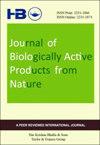黄酮苷地奥司明诱导人结肠癌细胞系DLD-1凋亡和细胞周期阻滞
IF 1
Q4 CHEMISTRY, MEDICINAL
Journal of Biologically Active Products from Nature
Pub Date : 2022-05-04
DOI:10.1080/22311866.2022.2081608
引用次数: 2
摘要
摘要本研究的目的是观察薯蓣皂苷是否诱导DLD-1细胞系凋亡并抑制细胞增殖。采用MTT、DCFDA、AO/EtBr、细胞周期分析、流式细胞仪膜联蛋白V-FITC凋亡、基因表达分析等方法,评价地奥司明在DLD-1人癌症细胞系中的体外抗结肠癌能力。在分析MTT测定结果的同时,观察到当诱导不同浓度的地奥司明时,发现DLD-1细胞以剂量依赖的方式被杀死。AO/EtBr双染色法观察地奥司明介导的细胞凋亡诱导作用。地奥司明在DLD-1细胞系中的处理产生大量的ROS,这正在使用ROS-DCFDA测定法进行分析。流式细胞术研究薯蓣皂苷对细胞周期分布的影响,发现薯蓣皂苷诱导的细胞周期阻滞发生在S期。当给予地奥司明时,存活细胞的比例降低,使用膜联蛋白V染色法证实了通过凋亡诱导细胞死亡的存在。Diosmin上调p53和p21的mRNA水平表达,表明Diosmin诱导的DLD-1细胞S期阻滞和凋亡部分受p21/p53信号通路控制。图形摘要本文章由计算机程序翻译,如有差异,请以英文原文为准。
Flavonoid Glycoside Diosmin Induces Apoptosis and Cell Cycle Arrest in DLD-1 Human Colon Cancer Cell Line
Abstract The purpose of this study was to see if diosmin induced apoptosis and inhibited cell proliferation in DLD-1 cell lines. The assays such as MTT, DCFDA, AO/EtBr, cell cycle analysis, annexin V-FITC apoptosis by flow cytometry, gene expression analysis were done to evaluate the in vitro anti-colon cancer potential of diosmin in DLD-1 human colon cancer cell line. While analyzing the results of MTT assay it is observed that when different concentrations of diosmin were induced, it was discovered that DLD-1 cells were killed in a dose-dependent manner. Diosmin mediated apoptosis induction is observed through AO/EtBr double staining method. Diosmin treatment in DLD-1 cell line generates high amount of ROS which is being analyzed using ROS DCFDA assay. While using flow cytometry to investigate the effect of diosmin on cell cycle distribution, it was found that diosmin-induced cell cycle arrest occurs in the S phase. When diosmin is administered, the proportion of surviving cells decreases, confirming the existence of cell death induction via apoptosis using the annexin V staining method. Diosmin upregulated mRNA levels expression of p53 and p21, indicating that diosmin induced S phase arrest and apoptosis in DLD-1 cells is controlled in part by the p21/p53 signaling pathway. GRAPHICAL ABSTRACT
求助全文
通过发布文献求助,成功后即可免费获取论文全文。
去求助
来源期刊

Journal of Biologically Active Products from Nature
Agricultural and Biological Sciences-Agricultural and Biological Sciences (miscellaneous)
CiteScore
2.10
自引率
0.00%
发文量
21
 求助内容:
求助内容: 应助结果提醒方式:
应助结果提醒方式:


